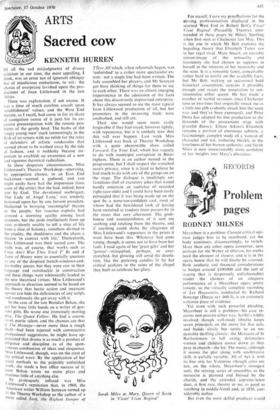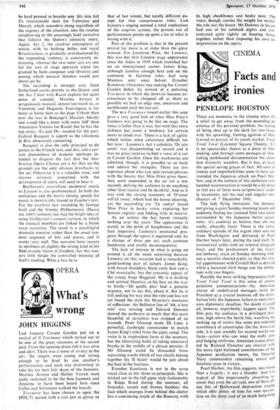RECORDS
Problem pages
RODNEY MILNES
Meyerbeer is a problem. Current critical opi- nion judges him to be moribund, yet the body continues, disconcertingly, to twitch. More than any other opera composer, save perhaps for the Weber of Oberon, his works need the element of theatre, and it is in the opera house that he will finally be assessed. Both aesthetic and financial considerations (a budget around £100,000 and the sort of staging that is desperately unfashionable) render the chances of an adequate .performance of a Meyerbeer opera pretty remote, so the virtually complete recording of Les Huguenots, conducted by Richard Bonynge (Decca SET 460-3), is an extremely welcome piece of evidence.
Yet even with such powerful pleading, Meyerbeer is still a problem—his case re- mains non-proven either way. Scribe's wildly involved though well-made libretto keeps seven principals on the move for five acts, and builds slowly but surely to an un- deniably thrilling climax : the Massacre of St Bartholomew in full swing. defenceless women and children mown down as they pray in church—the lot. The music, although it moves the plot along, with unobtrusive skill, is awfully variable. All of Act 4. with its fine aria for Valentine (though arias are not, on the whole, Meyerbeer's strongest suit), the stirring series of ensembles as the massacre is planned and blessed by the church, and the extended soprano/tenor duet, is first rate, theatre or no, as good as anything in middle-Verdi and, at 1836, con- siderably earlier.
But even the most skilful producer would be hard pressed to breathe any life into Act 3's interminable duet for Valentine and Marcel, which meanders along regardless of the urgency of the situation, into the routine rataplan-ing or the amazingly bald recitative that follows the Queen's climactic entry. Again, Act 2, the carefree atmosphere of which, with its bathing belles and royal flirtatiousness, is gradually overshadowed by the impending violence, is consistently in- teresting, whereas the two outer acts cry out for the sort of stage spectacle taken for granted by both composer and librettist and among which musical thinness would just about get by.
The recording is strongly cast. Joan Sutherland carols prettily as the Queen, and the Act 2 duet with Raoul exploits her quiet sense of comedy. Martina Arroyo is scrupulously musical, almost too much so, as Valentine and Huguette Tourangeau is far more at home here as the page Urbain than ever she was in Bonynge's Messiah. Ideally one would like a tenor with more 'biff' than Anastasios Vrenios for Raoul, but he has the top notes—Es and Ds—needed for the part. Gabriel Bacquier is superb as the villainous St Bris, obsessively conspiring.
Bacquier is also the only principal to do justice to the French text, and this, and a cer- tain plumminess of acoustic (perhaps in- tended to disguise the fact that the Am- brosian Opera Chorus are a bit thin on the ground) are the only obvious drawbacks to the set. Otherwise it is a valuable issue, and anyone seriously concerned . with the development of opera will need to hear it.
Beethoven's marvellous incidental music to Egmont is also problematical. In both the melodram and the hero's closing speech the music is inextricably bound to Goethe's text. For the excellent new recording by George Szell and the Vienna Philharmonic (Decca sm., 6465) someone has had the bright idea of using' Grillparzer's concert version, in which the musical numbers are linked by a blank verse narration. The result is a meaningful dramatic exercise rather than the usual ran- dom sequence of bits and pieces, and it works very well. The narrator/hero resorts to shrillness of slightly the wrong kind in his final ecstatic vision of freedom, but this mat- ters little beside the controlled intensity of 'Szell's reading. What a loss he is.







































 Previous page
Previous page